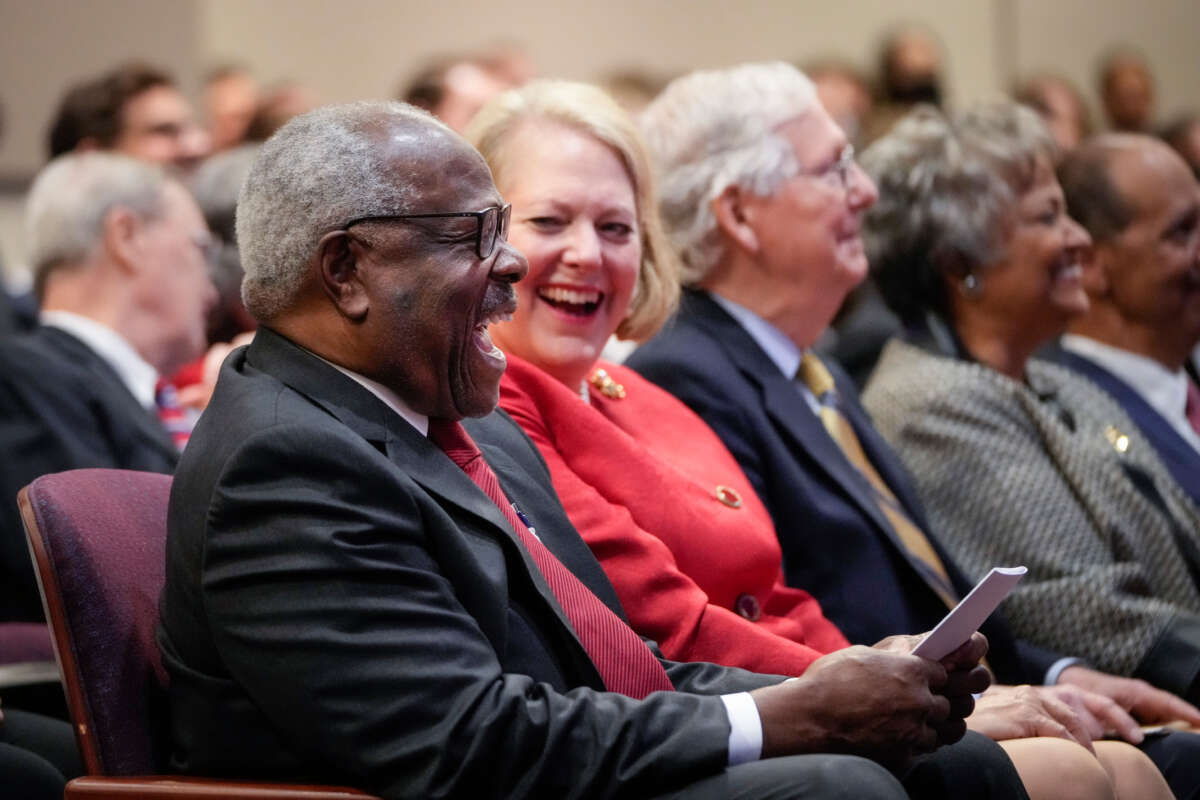Honest, paywall-free news is rare. Please support our boldly independent journalism with a donation of any size.
Democrats on the Senate Judiciary Committee are urging Supreme Court Justice Clarence Thomas to recuse himself from an upcoming decision on an appeal by Donald Trump’s legal team claiming immunity in his indictment related to the 2020 election.
The Democrats have argued in interviews that Thomas has a conflict of interest in the case due to his wife Ginni Thomas’s role in the January 6, 2021 attempted coup to install Trump as president. In the run-up to the certification of the 2020 election, Ginni Thomas leveraged her connections and sent texts to Trump chief of staff Mark Meadows in support of the plot to overturn the result. She also attended the “Stop the Steal” rally immediately before the crowd of Trump militants stormed the Capitol.
Senate Judiciary Chair Dick Durbin (D-Illinois) told CNN and The Hill that Clarence Thomas should consider recusing himself. “There are so many unanswered questions about the relationship of the justice and his family with the Trump administration that I think in the interests of justice, he should recuse himself,” Durbin said, per The Hill.
He went on to express concern that the Supreme Court may agree with Trump’s legal team and allow him to get his election indictment thrown out. “If we say certain people are above the law, I believe it diminishes values in this country,” he added.
On Monday, special counsel Jack Smith requested the Supreme Court to consider Trump’s claim that he has immunity from crimes he may have committed in the case because he was the president at the time. The Court has agreed to consider the request, and told Trump’s team to respond with their case by December 20.
This allows the case to leapfrog over the appeals court process, an ask Smith made due to concerns over the Trump team’s attempts to drag out the case in anticipation of the 2024 election. The trial for the election case is scheduled for March 4.
Clarence Thomas has faced scrutiny over his close ties to the attempted coup, and has been urged to recuse himself from several Trump-related cases prior to now; last year, the justice was the lone dissent on a Supreme Court decision to reject Trump’s bid to block the release of White House records concerning January 6.
Judiciary Committee members Senators Richard Blumenthal (D-Connecticut) and Mazie Hirono (D-Hawaii) also agreed that Ginni Thomas’s ties to Trump’s attempts to overturn the election — the heart of Trump’s election indictment — make it so that Clarence Thomas would have a conflict of interest in the result of the decision.
“Recusal usually applies when there’s an actual conflict and when there’s an appearance of conflict,” Hirono added, per The Hill. “I think in Clarence Thomas’s case, it’s both.”
She went on to say that Clarence Thomas should also have recused himself from previous cases related not just to Trump, but also the overall attempt to overturn the election, like when the Supreme Court considered Sen. Lindsey Graham’s (R-South Carolina) bid to avoid being questioned by a Georgia grand jury about his role in trying to get the election results overturned in the state.
“I think Justice Thomas should have recused himself from some of the other cases that came before him where his wife was very much involved. The fact he didn’t really raises concerns for whether they have a recusal practice that makes any kind of sense,” said Hirono.
Press freedom is under attack
As Trump cracks down on political speech, independent media is increasingly necessary.
Truthout produces reporting you won’t see in the mainstream: journalism from the frontlines of global conflict, interviews with grassroots movement leaders, high-quality legal analysis and more.
Our work is possible thanks to reader support. Help Truthout catalyze change and social justice — make a tax-deductible monthly or one-time donation today.
